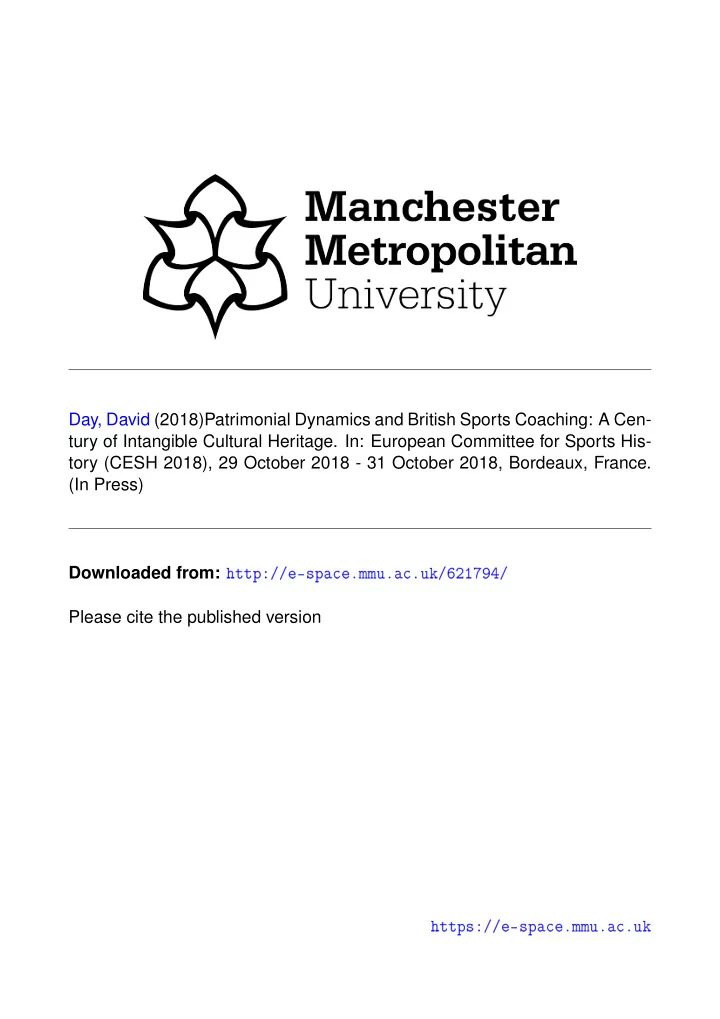

Day, David (2018)Patrimonial Dynamics and British Sports Coaching: A Cen- tury of Intangible Cultural Heritage. In: European Committee for Sports His- tory (CESH 2018), 29 October 2018 - 31 October 2018, Bordeaux, France. (In Press) Downloaded from: ❤tt♣✿✴✴❡✲s♣❛❝❡✳♠♠✉✳❛❝✳✉❦✴✻✷✶✼✾✹✴ Please cite the published version ❤tt♣s✿✴✴❡✲s♣❛❝❡✳♠♠✉✳❛❝✳✉❦
1 Patrimonial Dynamics and British Sports Coaching: A Century of Intangible Cultural Heritage At the 2008 Olympics, Britain finished fourth in the medal table, winning nineteen gold medals, a performance unmatched since 1908 and an impressive turnaround from 1996 when Britain won a single gold and finished thirty-sixth. The 2012 London Olympics saw Britain move to third in the medal table and the Rio Games witnessed further progress as the British team rose to second, the first time that a host nation had managed to improve its standings at a subsequent Olympics. This upwards trajectory can be directly attributed to a change in the State’s attitudes towards intervention in elite sport and to its decision in 1997 to invest heavily through the National Lottery. Since then more than 4,600 athletes have benefited, resulting in the winning of 633 Olympic and Paralympic medals. These initiatives signalled a major shift in attitudes towards elite sport in Britain and marked the point at which many of its long-held traditions were finally discarded. This paper examines a significant component of these traditions, Britain’s coaching heritage, and its relationship with amateurism, a key feature of the national sporting psyche and one that informed coaching discourses for over a century. This exploration not only provides a useful exemplar of the processes involved in studying cultural heritages but also exposes the role of patrimony in their evolution and consolidation. The peculiar development of British coaching can be directly attributable to the legacy left through the application of amateur values by a controlling sports elite that emerged in the late nineteenth century. Confident in their social and political status, this sporting aristocracy used its power and prestige to impose their own hegemonic version of acceptable sporting behaviour. The result was a long-lasting heritage in which the centrality of the volunteer coach, rather than the professional, and a focus on participation, rather than on performance, remained the dominant creeds for National Governing Bodies of sport throughout the twentieth century. The paper draws on a variety of sources, including the oral testimonies of professional coaches, who reflect on the struggles they had contending with the accepted, but often unspoken, heritage of British coaching and the patrimonial dynamics of the organisations that employed them. Evidence from recent Olympic performances is presented to illustrate the change in British fortunes following State intervention, which signified a critical shift in influence from a patrimonial elite to a late-twentieth century bureaucracy, epitomised by the quasi-autonomous non-governmental organisations (‘quangos’) established to resource elite performance. The arg ument presented here is that a dominant patrimony within late nineteenth-century British sport, who adhered strictly to amateur principles, were able to set the agenda for British coaching and that is was only in the 1990s, through bureaucratic rationalisation, that their control weakened and perspectives on this cultural heritage began to change. The paper further argues that, despite the innovations of the last twenty years, driven by a tightly prescribed government agenda emphasising targets and outcomes, the legacy of this heritage is so powerful that the volunteer remains the standard British coaching model. Intangible Cultural Heritage Heritage can be seen as the material or intangible result of a fundamentally fictitious past, serving the function of identity formation through the creation of a collective but selective memory. ‘Heritage’ indicates a mode of cultural production with reformative significance, a value-laden concept that is often represented by the notion of an inheritance bequeathed by previous generations to their successors. Heritage has traditionally been seen as being distinct from history and Lowenthal argued that rather than a critical inquiry into the past, heritage represents a celebration of it. Since 2000, there has been an upsurge of interest in Britain’s sporting heritage, highlighted not only by a growth in the number of sports - related museums and statues but also in relevant literature, such as English Heritage’s Played in Britain series, which charted the nation’s sporting heritage through architecture and sportscapes, art, archaeology and artefacts. The variety of these artefacts is extensive, ranging from buildings to objects, documents and oral testimonies. Heritage, then, represents a branch of cultural history in which narratives can be told in different ways and Harvey argues that heritage should be understood more as a process and a political and social construct than as ‘present - minded’ interpretations of physical artefacts. Just as historians have been criticised for an obsession with the written archive, heritage studies can sometimes appear to prioritise physical relics, but heritage is not restricted to the material reality of monuments, buildings, objects and accessories. It encompasses immaterial cultural heritage, a set of practices, expressions or representations that are acknowledged by a community as being part of its heritage. When visitors to heritage sites and museums were asked to define ‘heritage’, they highlighted notions of heritage as memory, workplace
Recommend
More recommend